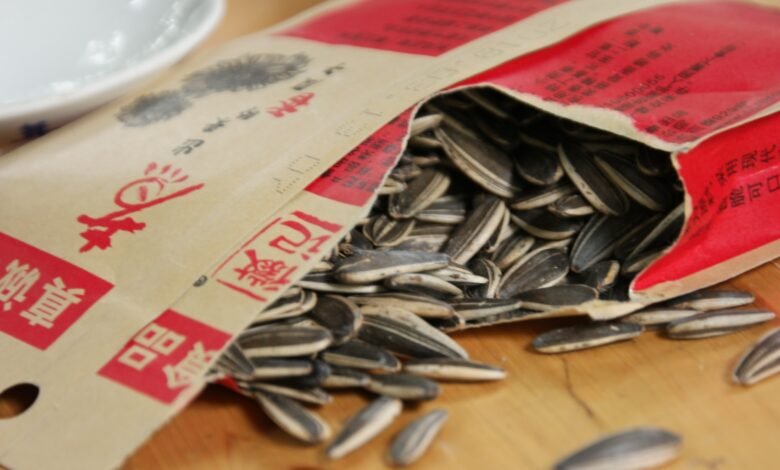5 Benefits of Chinese Sunflower Seeds for Cholesterol

Are you looking to incorporate sunflower seeds into your diet to help manage cholesterol?
LDL, also known as “bad” cholesterol, is a major cholesterol transporter. When there are a lot of these particles in your bloodstream, they may become unstable and harmful. High LDL levels can harden arteries, causing blockages and increasing the risk of heart disease.
Researchers have linked sunflower seed consumption to various health benefits, including reducing cholesterol and a lower risk of developing diseases such as high blood pressure or heart disease.
Learn more about the advantage of Chinese sunflower seeds for cholesterol.
Sunflower Seeds Nutritional and Health Benefits
Sunflower seeds are the seeds of the sunflower plant. They are white and have a tender texture, despite being encased in a black-and-white striped shell. You can eat Chinese sunflower seeds as snacks, raw, roasted, or incorporate them into other dishes because of their distinct nutty flavor and high nutritional value.
Popular as a health snack, sunflower seeds are great as salad toppings, breakfast cereals, or as a snack straight from the bag. They are high in nutrients such as healthy fats, minerals, and antioxidant compounds. Sunflower seeds may help reduce blood pressure, cholesterol, and blood sugar levels due to their high levels of vitamin E, magnesium, protein, linoleic fatty acids, and several plant compounds.
Traditional Chinese medicine uses sunflower seeds to rebuild energy and nourish the body. It provides impressive nutritional benefits in terms of dietary fiber, protein, and vitamins needed for lowering cholesterol in the body. These tiny seeds are a nutritional powerhouse. Including sunflower seeds in your diet may benefit your skin, heart, immunity, and overall health.
Top 5 Benefits of Chinese Sunflower Seeds for Cholesterol
These tiny seeds contain magnesium, a mineral involved in more than 300 body functions. Magnesium balances the body’s cholesterol naturally and has been shown to lower total serum cholesterol.
Here are the top five advantages of sunflower seeds in managing cholesterol levels:
1. High in Fiber
Sunflower seeds are high in fiber and protein, making them an excellent addition to granola bars, salads, and other recipes. The fiber content of sunflower seeds can help decrease LDL cholesterol levels in the blood, per a 2022 review report by Advances in Nutrition.
Cholesterol is a necessary substance produced by your body. Still, high levels of LDL (“bad”) cholesterol are associated with an increased risk of heart disease. Fiber consumption may lower cholesterol by decreasing the amount of LDL cholesterol in your blood.
Soluble fiber can help to reduce cholesterol absorption in the bloodstream. A daily intake of 5 to 10 grams of soluble fiber or more lowers LDL cholesterol. If lowering cholesterol is your objective, try eating more soluble fiber-rich foods like sunflower seeds and reducing saturated fat.
2. Monosaturated Fat
Even though one ounce of sunflower seeds contains a substantial amount of fat, most are healthy mono- and polyunsaturated fat. The American Heart Association claims that these fats are heart-healthy and anti-inflammatory. Unsaturated fats are beneficial because they can lower blood cholesterol levels and reduce inflammation. They also help maintain healthy cardiac rhythms and perform various other advantageous functions.
Research has found that plant-based monounsaturated fats may increase good cholesterol while lowering bad cholesterol. They also help with blood sugar regulation. Besides, replacing saturated fats with monounsaturated may help decrease harmful cholesterol levels.
Sunflower seeds contain a high concentration of unsaturated fatty acids, particularly linoleic acid. Linoleic acid is used by your body to create a hormone-like compound that relaxes blood vessels and promotes lower blood pressure. This fatty acid also aids in cholesterol reduction.
However, keep in mind that all dietary fat—unhealthy trans and saturated fats and beneficial monounsaturated and polyunsaturated fats—is higher in calories than protein and carbohydrates. As such, eating too much of it may result in weight gain.
3. Niacin or Vitamin B3
The body requires sufficient niacin, or vitamin B3, for overall health. One of the benefits of niacin is aiding in reducing triglycerides and increasing high-density lipoprotein (HDL) cholesterol. This “good” cholesterol aids in the removal of low-density lipoprotein (LDL) cholesterol from the bloodstream. High levels of niacin in sunflower seeds help minimize the risks of heart disease and total cholesterol levels.
Natural sources of niacin include meat, chicken, fish, and eggs, and plant foods like sunflower seeds. According to the USDA, one hundred grams of sunflower seeds have roughly 7 mg of niacin. A one-ounce serving of sunflower will give you 15% of the daily recommended dosage of Vitamin B3. Niacin is often used as an ingredient during product manufacture.
4. Rich in Protein
Some proteins, according to experts, may promote heart health and aid in lowering or eliminating elevated cholesterol from the body. You can minimize the risks of heart disease by substituting heart-healthy proteins like fish, legumes, poultry, almonds, and low-fat dairy for high-fat meats.
These proteins’ components can help you maintain a healthy weight while lowering cholesterol and blood pressure. By selecting these proteins over high-fat meat choices, you can reduce your risk of heart-related diseases.
5. Dietary Phytosterols
Nuts and seeds are a well-known source of phytosterols, plant substances with structural similarities to cholesterol that may lower LDL levels. Dietary phytosterols help balance cholesterol levels by lowering intestinal cholesterol absorption.
Sunflower seeds contain phytosterols, which are an essential component in the prevention of high cholesterol. When more phytosterols are absorbed, there is less room for cholesterol in the body, and it is excreted. As a result, there is less cholesterol in the bloodstream overall.
It is more beneficial to boost phytosterol levels with food or supplements than medication. Two to three grams of these plant chemicals are advised to be consumed daily through diet, fortified foods, or supplements. Researchers at the Virginia Polytechnic Institute found the plant sterols in pistachios and sunflowers seeds are incredibly high.
In Conclusion
Eating sunflower seeds can be very beneficial for your reducing your cholesterol levels. However, like all nuts and seeds, they are very calorie-dense. Although these calories aren’t always bad for you if combined with exercise and an active lifestyle, you should be aware of high levels. One ounce of sunflower kernels has 163 calories. Therefore a few handfuls will provide a significant amount of calories. In addition, avoid high-salt meals like salted sunflower seeds if you have high blood pressure or are salt sensitive. High-salt diets have been associated with high blood pressure. Instead, pick mildly salted or unsalted sunflower seeds. Most importantly, consult your dietician or physician on how to use sunflower seeds to reduce your cholesterol.





